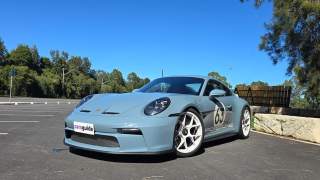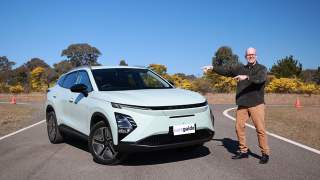It’s normally impossible to get all 24 Supercars drivers to agree on anything, given their competitive nature. But one topic has drawn unanimous agreement: none of them want the paddle-shift gearbox in the new-for-2022 Chevrolet Camaro and Ford Mustang.
Supercars organisers are introducing a new technical package next season, dubbed ‘Gen3’, that they hope will make the cars more exciting to watch, but also cheaper to build and run.
One of the ways to achieve that is introducing a new gearbox system, which would replace the current sequential stick shift with Formula 1-style steering-wheel-mounted paddle-shifters, potentially with an automatic ‘throttle blip’ on downshifts that would protect the engine from over-revving and therefore potentially save teams expensive repair bills.
However, it would also make the cars easier to drive and that is something the drivers don’t want. And in a rare display of unity, the drivers have publicly railed against the switch, with championship leader Shane van Gisbergen declaring after last weekend’s race at Sandown that Supercars should “throw paddle-shift in the bin.”
Former Bathurst 1000 winner David Reynolds agrees, telling CarsGuide that a move away from the current system of a sequential gear shifter would be a mistake because it would take away something special from the category.
He explained that the challenge of braking while downshifting, which requires drivers to ‘heel-and-toe’ technique, is one the hardest aspects of driving a modern Supercar and helps separate the drivers on skill.
“What we have is unique. Everyone else has gone that way [paddle-shift], so why should we go that way too?” Reynolds said.
“You want things to go wrong, you want the human element rather than the electronics taking over.”
Reynolds said that switching to paddle-shift would potentially make the racing less entertaining because the cars would be easier to drive and therefore less mistakes would be made, saying the organisers risk sanitising the sport too much.
Like many of his colleagues, Reynolds believes that the new regulations should focus on making the cars harder to drive, even if that means reduced aerodynamic downforce and less grippy tyres.
The Gen3 rule package, which will see the current Holden Commodore replaced by the Camaro and major changes to the Mustang, aims to cut downforce by as much as 50 per cent. Drivers have complained repeatedly in recent years that the cars have become too sensitive to aerodynamics, which makes it harder to overtake.
“I’ve been a part of the category for 10 years and I’ve watched the evolution of aero,” Reynolds told CarsGuide. “The cars have gotten easier to drive and harder to pass.”
The same is true of the control Dunlop tyres. Reynolds believes the sport would be better served with tyres that degrade more, which would put an onus on the drivers to manage them better during the race, which in turn should lead to more unpredictable results and more on-track action.
“You need the tyres to wear out, you need variables to make it easier for us to go about our jobs,” he said.
Supercars is yet to commit to a paddle-shift transmission, with the first prototype of the new Gen3 car believed to be on course to be completed and hit the track for initial testing by the middle of the year.















Comments